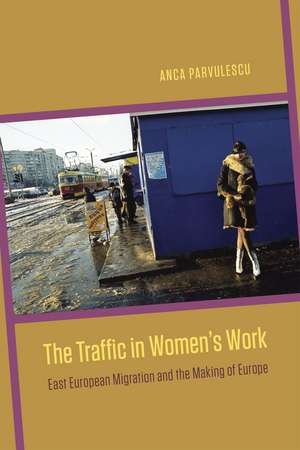The Traffic in Women's Work: East European Migration and the Making of Europe
Autor Anca Parvulescuen Limba Engleză Paperback – 12 iun 2014
Parvulescu revisits Claude Lévi-Strauss’s concept of kinship and its rearticulation by second-wave feminists, particularly Gayle Rubin, to show that kinship has traditionally been anchored in the traffic in women. Reading recent cinematic texts that help frame this, she reveals that in contemporary Europe, East European migrant women are exchanged to engage in labor customarily performed by wives within the institution of marriage. Tracing a pattern of what she calls Americanization, Parvulescu argues that these women thereby become responsible for the labor of reproduction. A fascinating cultural study as much about the consequences of the enlargement of the European Union as women’s mobility, The Traffic in Women’s Work questions the foundations of the notion of Europe today.
Preț: 160.10 lei
Preț vechi: 199.25 lei
-20% Nou
Puncte Express: 240
Preț estimativ în valută:
30.64€ • 31.79$ • 25.61£
30.64€ • 31.79$ • 25.61£
Carte indisponibilă temporar
Doresc să fiu notificat când acest titlu va fi disponibil:
Se trimite...
Preluare comenzi: 021 569.72.76
Specificații
ISBN-13: 9780226118383
ISBN-10: 022611838X
Pagini: 280
Ilustrații: 30 halftones
Dimensiuni: 152 x 229 x 18 mm
Greutate: 0.31 kg
Ediția:New.
Editura: University of Chicago Press
Colecția University of Chicago Press
ISBN-10: 022611838X
Pagini: 280
Ilustrații: 30 halftones
Dimensiuni: 152 x 229 x 18 mm
Greutate: 0.31 kg
Ediția:New.
Editura: University of Chicago Press
Colecția University of Chicago Press
Notă biografică
Anca Parvulescu is professor of English at Washington University in St. Louis. She is the author of Laughter: Notes on a Passion. She lives in St. Louis, MO.
Cuprins
Acknowledgments
Introduction
1. European Kinship: East European Women Go to Market
2. Import/Export: Housework in an International Frame
3. The Female Homo Sacer: The Traffic in Coerced Reproduction
4. “Give Me Your Passport”: The Traffic in Women in a “Europe without Borders”
5. Ways Out: Hospitality and Free Love
Notes
IndexRecenzii
“In The Traffic in Women’s Work, Parvulescu makes a compelling case for the role of East European women in the creation of a ‘new Europe.’ Thanks to the invisible labor of cleaners, housewives, sex workers, caregivers, and other women on the move, the map of Europe is being radically redrawn. Parvulescu’s sophisticated arguments are essential reading for scholars in European studies, gender studies, and transnational studies—as well as anyone interested in bold and boundary-pushing thought.”
“Offers a compelling argument for a new Europe, whose formation rests on the extraction of Eastern European women’s gendered and racialized labor. . . . What makes Parvulescu’s work groundbreaking is the explanatory power that she invests the notion of the ‘traffic in women.’ She re-creates it as an analytical term that is sensitive to the rhetorical, political, and economic rearrangements required by the eastward enlargement of the European Union. . . . I hope that scholars and students of women’s and gender studies, European studies, and migration studies will be inspired to continue the explorations she so compellingly began with this volume.”
“What is the hidden link between the famous four freedoms on which the European Union is based and the infamous traffic in women? Parvulescu magisterially explores how the one tacitly implies and produces the other. The endless flow of women from East to West is the less glamorous subplot of the celebrated European freedom, implying new postcolonial divisions, raising far-reaching issues not only about gendered labor and the nature of globalization but also fundamental questions about the very nature of the exchange lying at the basis of the social. The book explores these questions with great verve, erudition, and passionate engagement through the spyglass of some exceptionally well-chosen recent films, paving new ways of conceiving feminism and politics.”
